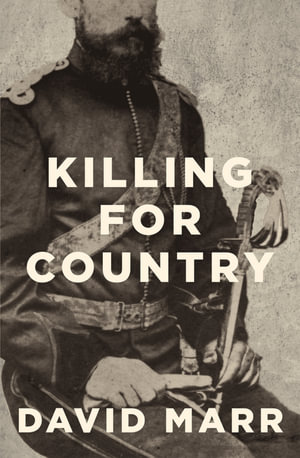Killing for country, a family story by David Marr

‘It’s ghastly’ was the comment of one of Marr’s acknowledged early readers of his latest book, and she is right, it is ghastly, but sadly it is a truthful account of this country’s history, a history that most Australians either refuse to acknowledge or are ignorant about. David Marr’s book is a thoroughly, meticulously, researched history which he embarked on after discovering his own family’s involvement in the brutal annihilation of Aboriginal people in order to facilitate the theft of land. Tracing the story of the Uhr family, on his mother’s side, he reveals life in early colonial Australia, and the invasion by sheep, led by vigilante squatters who did not hesitate to kill the native inhabitants in their way. It is a story of massacres and poisonings, a determined annihilation of the original inhabitants.
Two of Marr’s ancestors were officers in the Native Police, a military garrison which recruited black troops, led by white officers, to undertake the search and massacre of Aboriginal groups, beginning in New South Wales, then extending to Queensland, the Northern Territory, South Australia, and Western Australia. It was the old Imperial strategy of ‘divide and conquer’. Aboriginal people did not have a sense of themselves as one nation. Recruiters made sure to collect men outside of their traditional country and offered them plentiful food, women, some pay, status, and a sense of adventure. The job of the Native Police was to track and kill. In their reports the term ‘dispersal’ was a known euphemism for murdering any Aboriginal group, even as they slept. This is despite laws made in London guarding the rights of Aborigines to live, hunt and fish on their lands. The Native Police openly operated outside the law, with their services highly sought after in the outreaches of the colonies.
Shockingly, Marr recognises in the language of the colonies, the same arguments presented today in the lead-up to the 2023 referendum, the idea that the Aboriginal peoples are owed nothing, they are undeserving of special treatment. Why should they have special rights?
Exposing the history of Australia’s beginnings is not about imposing a sense of guilt. Marr himself says he does not feel guilt, he did not commit these crimes. It is about acknowledging the harsh history of this country, and feeling some empathy for the people who were so cruelly dispossessed. It is about truth telling and treating the original inhabitants with respect; seeking ‘makarrata’, a form of reconciliation with our past. The Uluru Statement from the Heart was a very generous offer to come together. Unfortunately it has been rejected by the majority of Australian people today.
Killing for country is a detailed account of early Australian history, exhaustive and unflinching in its determination to uncover the truth. For those not quite ready for tackling the book, there is an interesting discussion of its content in an interview with David Marr, in an Uncommon Sense podcast, on Soundcloud.
Themes: Australian history, Native Police, Massacres, Genocide, Truth telling.
Helen Eddy